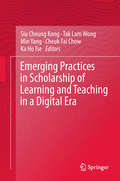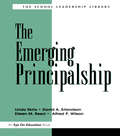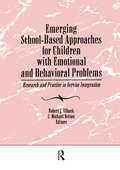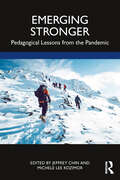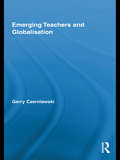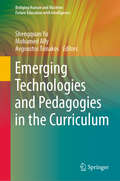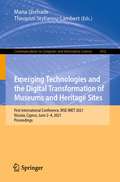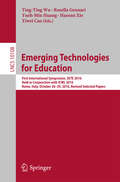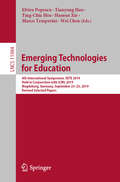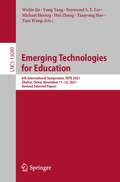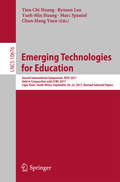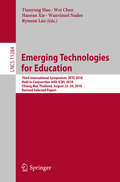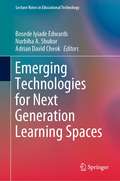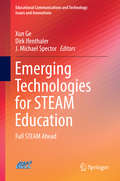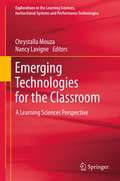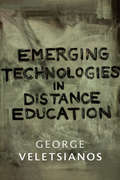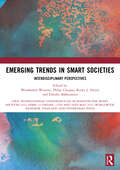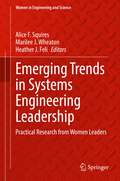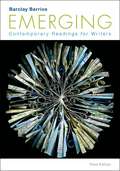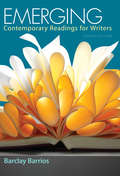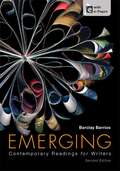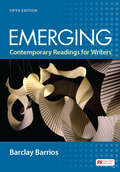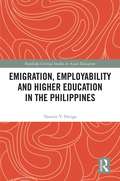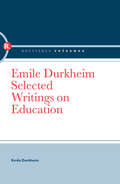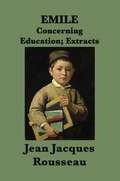- Table View
- List View
Emerging Practices in Scholarship of Learning and Teaching in a Digital Era
by Tak Lam Wong Siu Cheung Kong Min Yang Cheuk Fai Chow Ka Ho TseIn this book, we put forward a holistic conceptual framework for implementing Scholarship of Learning and Teaching (SoLT) in higher education. Unlike previous SoLT studies, which usually focus on a specific aspect, here various aspects are integrated into a holistic framework. Further, it identifies three main stakeholders, namely, the higher education institution, teaching staff, and students. These stakeholders are in turn connected by four interlocking themes: staff professional development, enhancement of student learning experiences, assessment, and digital technologies. Presenting chapters that address these four themes, this book supports the advancement of SoLT in higher education in relation to existing theories and emerging practices. By helping academics and leaders in higher education to implement SoLT for the improvement of student learning and teaching practices, it also makes a valuable contribution to the field of teacher education.
Emerging Principalship, The
by David A. Erlandson Linda Skrla Eileen ReedThis book makes a distinction between the "principal" - the man or woman who occupies the position - and the "principalship", the entire leadership function which, although overseen and coordinated by the principal, also includes activities of assistant principals, teachers, counselors, and others. It explains and applies the 21 domains recommended by the National Policy Board and demonstrates how they relate to the ISLLC standards.
Emerging School-Based Approaches for Children With Emotional and Behavioral Problems: Research and Practice in Service Integration
by C Michael Nelson Robert J IllbackIt is becoming recognized that the multiple and complex problems of children with emotional and behavioral problems and their families exceed the capacity of any single service system. Emerging School-Based Approaches for Children With Emotional and Behavioral Problems presents educators and social service practitioners with innovative programs and practices for these children while in school with emphasis on inter-service collaboration. The book fulfills a growing need for an organized discussion of how the integrated service paradigm can be applied in the context of school settings. Special consideration is given to the issues and problems that are idiosyncratic to schools as institutions. Emerging School-Based Approaches for Children With Emotional and Behavioral Problems shows school administrators, teachers, and child service providers conceptual, practice, and research aspects of integrated service programs in school settings. Professionals gain insight for planning organizational change as prominent experts and practitioners share their work across a range of issues and geographic sites. They explore these topics: systems of care for children and families schools as health delivery sites parent involvement for students with emotional and behavioral disorders program planning and evaluation planned organizational changeChapters provide readers with general information about the features of an integrated approach, provide practical examples of exemplary programs, and consider organizational change issues that can facilitate or impede movement toward a more collaborative approach. Programs presented focus on the development of more broad-based community services, less restrictive child placement, prevention of hospitalization and out-of-home placement, interagency collaboration, flexible and individualized services, and cost containment and efficiency. The integrated service movement in children’s services holds much promise as a means to create more comprehensive and coordinated school-based systems of care for children and families. Special education teachers and administrators, school and child clinical psychologists, and school counselors will find Emerging School-Based Approaches for Children With Emotional and Behavioral Problems fundamental to their understanding of the integrated systems approach and a helpful guide as they undergo their own organizational changes.
Emerging Stronger: Pedagogical Lessons from the Pandemic
by Jeffrey Chin and Michele Lee KozimorResponding to the sudden and far-reaching implications of the COVID-19 pandemic in college classrooms and on campus, Emerging Stronger assembles an original compilation of chapters that revisit, reframe, and refine the practice of teaching in a fundamentally altered landscape. Cultivated from a wide array of different fields, from sociology and political science to literature and secondary education, expert contributors to this volume extend their scholarship on teaching and learning and offer thoughtful pieces about curricular innovation, teaching tools and techniques, and evidence-based approaches that will interest dedicated faculty in any discipline. The chapters fall into three categories—Modalities of Teaching and Learning, Pedagogical Strategies, and Student Engagement—each of which carry an all-important focus on what readers should know about best practices now and for the foreseeable future. Whether experienced faculty, scholars just starting out in their teaching careers, or aspiring graduate students, readers of this volume will come away with great techniques and strategies, but also community, hope, and opportunity to strengthen their teaching and provide better learning environments in their classrooms.
Emerging Teachers and Globalisation (Routledge Research in Education)
by Gerry CzerniawskiWhile globalization has had tremendous influence on the world of teaching, national cultural traditions continue to influence systems of schooling, national curricula, and teachers’ values and classroom practices. This book explores the effects of globalisation on teachers through an examination of the values held by beginning teachers in three distinctly different education systems. Utilizing interview data from teachers within the social democratic traditions of Norway, the ‘corporatist welfare’ regime seen in Germany and the more individualised, market-led approach to education adopted in England, the book highlights the extent to which teacher identity formation is impacted by national pedagogic traditions, national policy contexts and institutional settings. The study examines the convergence and divergence between the three systems and their culturally specific settings. Students and scholars in the fields of Education Studies, Teacher Education and Training, and Comparative Education will find this book a fascinating and important read.
Emerging Technologies and Pedagogies in the Curriculum (Bridging Human and Machine: Future Education with Intelligence)
by Mohamed Ally Shengquan Yu Avgoustos TsinakosThis book explores the technologies that can be used in curricula to make education “smarter” and more adaptive in order to better meet the needs of today’s learners. The main emphasis is based on the theory and best practices of incorporating emerging technologies into curricula so as to educate learners in the 21st century. The book provides valuable insights into the future of education and examines which pedagogies are most suitable for integrating emerging technologies. It will help educators and stakeholders design and implement curricula that effectively prepare learners for the challenges of tomorrow.
Emerging Technologies and the Digital Transformation of Museums and Heritage Sites: First International Conference, RISE IMET 2021, Nicosia, Cyprus, June 2–4, 2021, Proceedings (Communications in Computer and Information Science #1432)
by Theopisti Stylianou-Lambert Maria ShehadeThis book constitutes the post-conference proceedings of the First International Conference on Emerging Technologies and the Digital Transformation of Museums and Heritage Sites, RISE IMET 2020, held in Nicosia, Cyprus, in June 2021*.The 23 revised full papers were carefully reviewed and selected from 38 submissions. The papers are organized in the following topical sections: digital curation and visitor engagement in museums and heritage sites; VR, AR, MR, mobile applications and gamification in museums and heritage sites; digital storytelling and embodied characters for the interpretation of cultural heritage; emerging technologies, difficult heritage and affective practices; participatory approaches, crowdsourcing and new technologies; digitization, documentation and digital representation of cultural heritage.* The conference was held virtually due to the COVID-19 pandemic.
Emerging Technologies for Education
by Yiwei Cao Yueh-Min Huang Ting-Ting Wu Rosella Gennari Haoran XieThis book constitutes the thoroughly refereed post-workshop proceedings of the First International Symposium, SETE 2016, held in conjunction with ICWL 2016, Rome, Italy, in October 2016. The 81 revised papers, 59 full and 22 short ones, were carefully reviewed and selected from 139 submission. They cover latest findings in various areas, such as emerging technologies for open access to education and learning; emerging technologies supported personalized and adaptive learning; emerging technologies support for intelligent tutoring; emerging technologies support for game-based and joyful learning; emerging technologies of pedagogical issues; emerging technologies for affective learning and emerging technologies for tangible learning.
Emerging Technologies for Education: 4th International Symposium, SETE 2019, Held in Conjunction with ICWL 2019, Magdeburg, Germany, September 23–25, 2019, Revised Selected Papers (Lecture Notes in Computer Science #11984)
by Wei Chen Elvira Popescu Marco Temperini Haoran Xie Tianyong Hao Ting-Chia HsuThis book constitutes the thoroughly refereed post-workshop proceedings of the 4th International Symposium, SETE 2019, held in conjunction with ICWL 2019, in Magdeburg, Germany, in September 2019. The 10 full and 6 short papers presented together with 24 papers from 5 workshops were carefully reviewed and selected from 34 submissions. The papers cover the latest findings in various areas, such as: virtual reality and game-based learning; learning analytics; K-12 education; language learning; design, model and implementation of e-learning platforms and tools; digitalization and industry 4.0; pedagogical issues, practice and experience sharing.
Emerging Technologies for Education: 6th International Symposium, SETE 2021, Zhuhai, China, November 11–12, 2021, Revised Selected Papers (Lecture Notes in Computer Science #13089)
by Hui Zhang Weijia Jia Tianyong Hao Yong Tang Raymond S. T. Lee Michael Herzog Tian WangThis book constitutes the refereed conference proceedings of the 6th International Symposium on Emerging Technologies for Education, SETE 2021, held in Zhuhai, China in November 2021. 35 full papers were accepted together with 8 short papers out of 58 submissions. The papers focus on the following subjects: Emerging Technologies for Education, Digital Technology, Creativity, and Education; Education Technology (Edtech) and ICT for Education; Education + AI; Adaptive Learning, Emotion and Behaviour Recognition and Understanding in Education; as well as papers from the International Symposium on User Modeling and Language Learning (UMLL2021) and the International Workshop on Educational Technology for Language Learning (ETLL 2021).
Emerging Technologies for Education: Second International Symposium, Sete 2017, Held In Conjunction With Icwl 2017, Cape Town, South Africa, September 20-22, 2017, Proceedings (Lecture Notes in Computer Science #10676)
by Rynson Lau Yueh-Min Huang Marc Spaniol Tien-Chi Huang Chun-Hung YuenThis book constitutes the thoroughly refereed post-workshop proceedings of the Second International Symposium, SETE 2017, held in conjunction with ICWL 2017, Cape Town, South Africa, in September 2017. The 52 full and 13 short papers were carefully reviewed and selected from 123 submissions. This symposium attempts to provide opportunities for the crossfertilization of knowledge and ideas from researchers in diverse fields that make up this interdisciplinary research area.
Emerging Technologies for Education: Third International Symposium, SETE 2018, Held in Conjunction with ICWL 2018, Chiang Mai, Thailand, August 22–24, 2018, Revised Selected Papers (Lecture Notes in Computer Science #11284)
by Wei Chen Rynson Lau Haoran Xie Tianyong Hao Wanvimol NadeeThis book constitutes the thoroughly refereed post-workshop proceedings of the Third International Symposium, SETE 2018, held in conjunction with ICWL 2018, Chiang Mai, Thailand, in August 2018.The 23 full and 3 short papers were carefully reviewed and selected from 51 submissions. The papers have been organized in the following topical sections: Emerging Technologies of Design, Model and Framework of Learning Systems; Emerging Technologies Support for Intelligent Tutoring; Emerging Technologies Support for Game-Based and Joyful Learning; Emerging Technologies of Pedagogical Issues; UMLL (International Symposium on User Modeling and Language Learning); ETLTL (International Workshop on Educational Technology for Language and Translation Learning)
Emerging Technologies for Next Generation Learning Spaces (Lecture Notes in Educational Technology)
by Adrian David Cheok Bosede Iyiade Edwards Nurbiha A. ShukorThis book discusses the development of the next generation learning spaces with emerging technologies. These spaces result from the combined needs of classroom stakeholders, such as instructors and learners, with classroom elements, such as tools and technologies, pedagogy and content. The book presents discussions and studies on issues, possibilities and implications of these changes for next generation education. Novel ideas, and studies on these all-encompassing, blended roles of technologies in next generation learning spaces are clearly presented. Suggestions on how the benefits they offer can be maximized are also discussed. Engaging learning technologies have remained central in education for assisting instructors to teach and learners to learn, more effectively. However, recent technological growth is creating a system in which previous divides between key classroom concepts and stakeholders are getting progressively blurred. This is giving rise to next generation learning spaces where elements and stakeholders are blended into one. The book addresses the future of learning environments based on these perspectives.
Emerging Technologies for STEAM Education
by Dirk Ifenthaler J. Michael Spector Xun GeThis theory-to-practice guide offers leading-edge ideas for wide-scale curriculum reform in sciences, technology, engineering, the arts, and mathematics--the STEAM subjects. Chapters emphasize the critical importance of current and emerging digital technologies in bringing STEM education up to speed and implementing changes to curricula at the classroom level. Of particular interest are the diverse ways of integrating the liberal arts into STEM course content in mutually reshaping humanities education and scientific education. This framework and its many instructive examples are geared to ensure that both educators and students can become innovative thinkers and effective problem-solvers in a knowledge-based society. Included in the coverage: Reconceptualizing a college science learning experience in the new digital era. Using mobile devices to support formal, informal, and semi-formal learning. Change of attitudes, self-concept, and team dynamics in engineering education. The language arts as foundational for science, technology, engineering, art, and mathematics. Can K-12 math teachers train students to make valid logical reasoning? Moving forward with STEAM education research. Emerging Technologies for STEAM Education equips educators, education researchers, administrators, and education policymakers with curricular and pedagogical strategies for making STEAM education the bedrock of accessible, relevant learning in keeping with today's digital advances.
Emerging Technologies for the Classroom
by Chrystalla Mouza Nancy LavigneThis book provides contemporary examples of the ways in which educators can use digital technologies to create effective learning environments that support improved learning and instruction. These examples are guided by multiple conceptual and methodological traditions evolving from the learning sciences and instructional technology communities as well as other communities doing important work on learning technologies. In particular, the book provides examples of technology innovations and the ways in which educators can use them to foster deep understanding, collaboration, creativity, invention, and reflection. Additional examples demonstrate the ways in which emerging mobile and networked technologies can help extend student learning beyond the confines of the classroom wall and support student-directed learning and new media literacies.
Emerging Technologies in Distance Education
by George VeletsianosA one-stop knowledge resource, Emerging Technologies in Distance Education showcases the international work of research scholars and innovative distance education practitioners who use emerging interactive technologies for teaching and learning at a distance. This widely anticipated book harnesses the dispersed knowledge of international experts who highlight pedagogical, organizational, cultural, social, and economic factors that influence the adoption and integration of emerging technologies in distance education.
Emerging Trends in Smart Societies: Interdisciplinary Perspectives
by Worakamol Wisetsri Philip Clingan Rocky J. Dwyer Dilrabo BakhronovaEmerging Trends in Smart Societies: Interdisciplinary Perspectives” captures the essence of the groundbreaking initiative heralded by the inaugural International Conference on Humanities for Smart Societies 2023 (HMSS 23). This milestone event convenes a global cohort of scholars, policymakers, and thinkers, transcending geographical confines via a pioneering virtual platform.The book crystallizes the convergence of diverse disciplines – from humanities to management – fostering an exchange of innovative ideas vital for sustainable, digitally transformed societies. By orchestrating cross-disciplinary dialogues, this anthology unveils novel solutions and holistic approaches to contemporary challenges.
Emerging Trends in Systems Engineering Leadership: Practical Research from Women Leaders (Women in Engineering and Science)
by Marilee J. Wheaton Alice F. Squires Heather J. FeliThis book celebrates the efforts of women in the international systems engineering community. While there are dozens of books that tackle the topic of systems engineering and thousands of books that address leadership, this book is unique. Emerging Trends in Systems Engineering Leadership: Practical Research from Women Leaders presents personal, well-researched, hands-on perspectives of emerging trends in systems engineering leadership from industry, government, and academia, covering timely topics applicable across many domains – all under one cover. This book presents material for engineers, scientists, technologists, and others to help them tackle challenges in their everyday work dealing with complex socio-technical systems. The book provides guidance for leaders on shoring up essential (soft) skills to address the increasing demand for professional competencies; addresses diversity, equity, inclusion, and empowering women in the workforce; discusses broader facets of systems engineering leadership including systems thinking, ethics and utilitarianism; and investigates the impact of emerging technological change on systems resilience and the digital enterprise. This book provides a multi-perspective approach for leaders to navigate a changing world and develop and deliver optimal system solutions to global societal challenges that meet human needs. To this end, the authors extend beyond the solid technical base to encompass the human aspect of system behavior. This book is written by twenty-six female authors (three of whom also serve as the editors) from around the world at varying career stages who share their research, achievements, perspectives, and successes in emerging areas of systems engineering leadership.Testimonials:“As the systems that modern society depends on get more complicated and complex, we are in the midst of a renaissance with regard to research relating to systems engineering and science. A vast majority of this research is focused on the development of a modern toolkit for systems engineers today and into the future. This takes the form of new and improved methods, models, methodology, processes and tools. This research is critical but likely insufficient without a focus on the most valuable resource with regard to systems engineering within any organization – the human resource. Therein lies the focus of this textbook. It addresses systems engineering leadership from a variety of perspectives, while also addressing broad aspects relating to mentoring and the necessary evolving competencies that we need to address in today’s workforce. This emphasis makes this book unique. The icing on the cake is that all the chapters in this textbook are written by contemporary women leaders – this provides a necessary and unique perspective on the topic of leadership – that is long overdue! I highly recommend this textbook to all my colleagues in academia, industry, and government.”Dinesh Verma, Ph.D.Professor, Systems Engineering, School of Systems and EnterprisesExecutive Director, Systems Engineering Research Center (SERC)Stevens Institute of Technology, Hoboken, NJ 07030“The past decade has seen a dramatic increase in the number of women who are formally recognized in systems engineering technical, management and leadership positions in all sectors. With industry, academia, professional systems engineering societies and publishers enabling and illuminating the growing and substantial contributions of women in engineering, women have unprecedented opportunities today to contribute to systems engineering in both leadership and management positions. This volume, a compendium of chapters written by enterprising international women leaders at various stages in their career, addresses diverse topics such as leadership, management, empowerment, equity, diversity, inclusion, and mentoring. It is a valuable resource f
Emerging: Contemporary Readings For Writers
by Barclay BarriosEmerging uses an inquiry-based approach and engaging readings to help students understand and write about a variety of academic texts. Based on reviewer feedback, the third edition uses its assignment sequences to pose questions about the important but unsettled issues that shape students’ lives, such as “How is technology changing us?” and “How can you make a difference in the world?” Thought-provoking, contemporary readings help them address those questions in a meaningful way. At its core, Emerging focuses on the skills necessary for academic writing in any discipline, and a thoroughly revised Part One offers concrete strategies for improving those skills: reading critically, synthesizing, arguing, using evidence, and revising. Twenty vibrant new readings keep Emerging in tune with the newest ideas that will challenge students to think beyond their own experiences—and beyond the classroom.
Emerging: Contemporary Readings For Writers
by Barclay BarriosEmerging focuses on the skills necessary for academic writing in any discipline—and offers concrete strategies for improving those skills. Author Barclay Barrios uses an inquiry-based approach to help students understand and write about a variety of texts, while innovative assignment sequences explore the important but unsettled issues that shape our lives, such as How is technology changing us?, How can you make a difference in the world?, and a central question of our time, How can we get along? Thought-provoking, contemporary readings help students address those questions in meaningful ways. Fifteen new readings and updated writing assignments keep Emerging in tune with current ideas that will challenge students to think beyond their own experiences—and beyond the classroom.
Emerging: Contemporary Readings for Writers
by Barclay BarriosHow should money be distributed? What is the future of food? How do we identify and combat stereotyping?Emerging engages students with meaningful contemporary issues so that they can develop the skills they need to address the large questions that will shape their lives. To help students learn to bridge public and academic conversations,Emerging focuses its support on building key academic skills: reading critically, synthesizing, arguing, using evidence, and revising. With a more accessible range of readings, the second edition includes substantial and shorter selections, as well as visuals and online multimodal texts that will challenge students' assumptions and spark considered writing. The print text is now integrated with e-Pages for Emerging,designed to take advantage of what the Web can do.
Emerging: Contemporary Readings for Writers
by Barclay BarriosEmerging helps you think through and today’s biggest issues of today, helping you improve your writing every step of the way.
Emigration, Employability and Higher Education in the Philippines (Routledge Critical Studies in Asian Education)
by Yasmin Y. OrtigaThis book investigates the dilemma of educating students for future work in the context of the Philippines, one of the top sources of migrant labor in the world. Here, colleges and universities are expected to not only educate students for jobs within the country, but for potential employers beyond national borders. It demonstrates how human capital ideology reinforces such export-oriented education, creating an assumed relationship among academic credentials, overseas opportunity, and future migrant remittances. Findings indicate that attempts to produce migrant workers undermine the job security of college instructors, skew local curriculum towards foreign requirements, and challenge efforts to develop academic programs in line with local needs. As more developing nations turn to migration as a development strategy, colleges and universities face increasing pressures to produce future migrant workers who will have an advantage over other nationalities. This book emphasises the importance of understanding how this global phenomenon affects colleges and universities, as well as the teachers and students within these institutions. This book raises important questions on the role of universities in today’s global economy and the effects of contemporary migration flows on developing countries.
Emile Durkheim: Selected Writings on Education (Routledge Library Editions)
by W. S. F. PickeringEmile Durkheim is widely lauded as one of the founding fathers of modern Sociology and for his substantial contribution to the sociology of education. This set brings some of his most important writings on the subject together for the first time.
Emile or Concerning Education
by Jean Jacques Rousseauémile, or On Education is a treatise on the nature of education and on the nature of man written by Jean-Jacques Rousseau, who considered it to be the "best and most important of all my writings." Due to a section of the book entitled "Profession of Faith of the Savoyard Vicar," émile was banned in Paris and Geneva and was publicly burned in 1762. During the French Revolution, émile served as the inspiration for what became a new national system of education.
